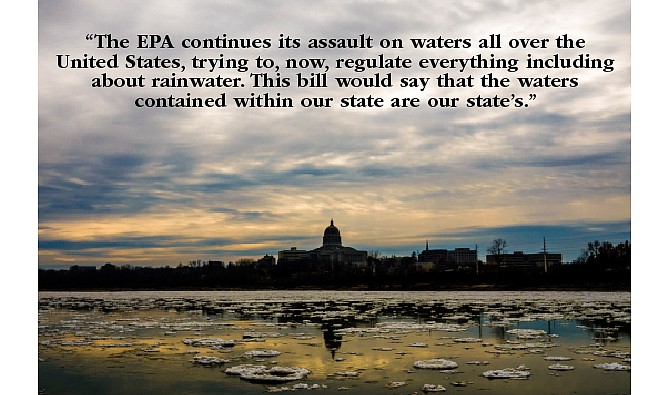Two Mid-Missouri lawmakers want the state Legislature - not the federal government - to define who owns and controls water and the nearby land in the state.
But the two Republicans offer different reasons for introducing their bills in the Legislature that would rewrite existing state law so the definition of the "waters of Missouri" no longer includes "waters of the United States lying within the state."
Sen. Mike Kehoe, R-Jefferson City, submitted his bill to the state Senate on Wednesday, saying: "The EPA continues its assault on waters all over the United States, trying to, now, regulate everything including about rainwater.
"This bill would say that the waters contained within our state are our state's, and that we have the right to maintain what is done, or not done, with those waters."
Rep. Rocky Miller, R-Lake Ozark, prefiled his bill last month and, on Tuesday, it was assigned to the House Conservation and Natural Resources Committee. No hearings have been scheduled yet in the House committee.
"The main reason we need it is for clarification," Miller told the News Tribune. "For the longest time, you had a definition of the "waters of Missouri' and, at the very end of it, it says, "and the waters of the U.S.' (You) understood it meant very little. You understood that "waters of the U.S.' was, kind of, something separate."
"But, under recent (EPA) rule-makings that they've had, and interpretations - the "waters of the U.S.,' we really don't know what that is, anymore."
The federal Environmental Protection Agency has proposed a rule, the agency says on its web page, www2.epa.gov/uswaters/proposal-protect-clean-water#chunks, "that under the Clean Water Act:
• "Most seasonal and rain-dependent streams are protected.
• "Wetlands near rivers and streams are protected.
• "Other types of waters may have more uncertain connections with downstream water and protection will be evaluated through a case specific analysis of whether the connection is or is not significant. However, to provide more certainty, the proposal requests comment on options protecting similarly situated waters in certain geographic areas or adding to the categories of waters protected without case specific analysis."
In explaining his bill to the Senate, Kehoe said: "I think it's a great way to send a message to the federal government that we are not going to be a part of this over-reach and their act to go around Congress in imposing these rules amongst our businesses and our agriculture industry."
Miller said Wednesday: "There are people who like it and say, "Aha! It really shows the federal government that we're not going to listen to them!'
"I'd love for that to be the reason behind it - because I think it makes me feel good that we're standing up for states' rights.
"But that's not the reason for this one - the reason for this one is so that we know what to permit (and) the definition in the regulations is for "waters in the state of Missouri.'"
Also Wednesday, U.S. Sen. Roy Blunt introduced an amendment to the congressional legislation that would approve construction of the Keystone XL Pipeline, which Blunt has co-sponsored and which President Barack Obama has promised to veto.
Blunt's news release reported: "The "Community Affordability Amendment' directs the Environmental Protection Agency (EPA) to collaborate with the National Academy of Public Administration to review existing studies of costs associated with major EPA regulations.
"The amendment also directs the administration to determine how different localities can effectively fund municipal projects."
Kehoe said the proposals are not just a case of Republicans challenging a Democrat president and his administration.
"We're so far past a problem with pollution in the rules that the EPA is promulgating, it's absolutely unbelievable," he said. "I don't think there's any Missourian - or citizen of the United States - (who) wants to see pollution flow, whether it's from a dry ditch or an existing stream or pond, into our waterways and pollute the system. This is way beyond that. ...
"I've talked to many Democrats, Republicans (and) Independents who believe this is an over-reach."

